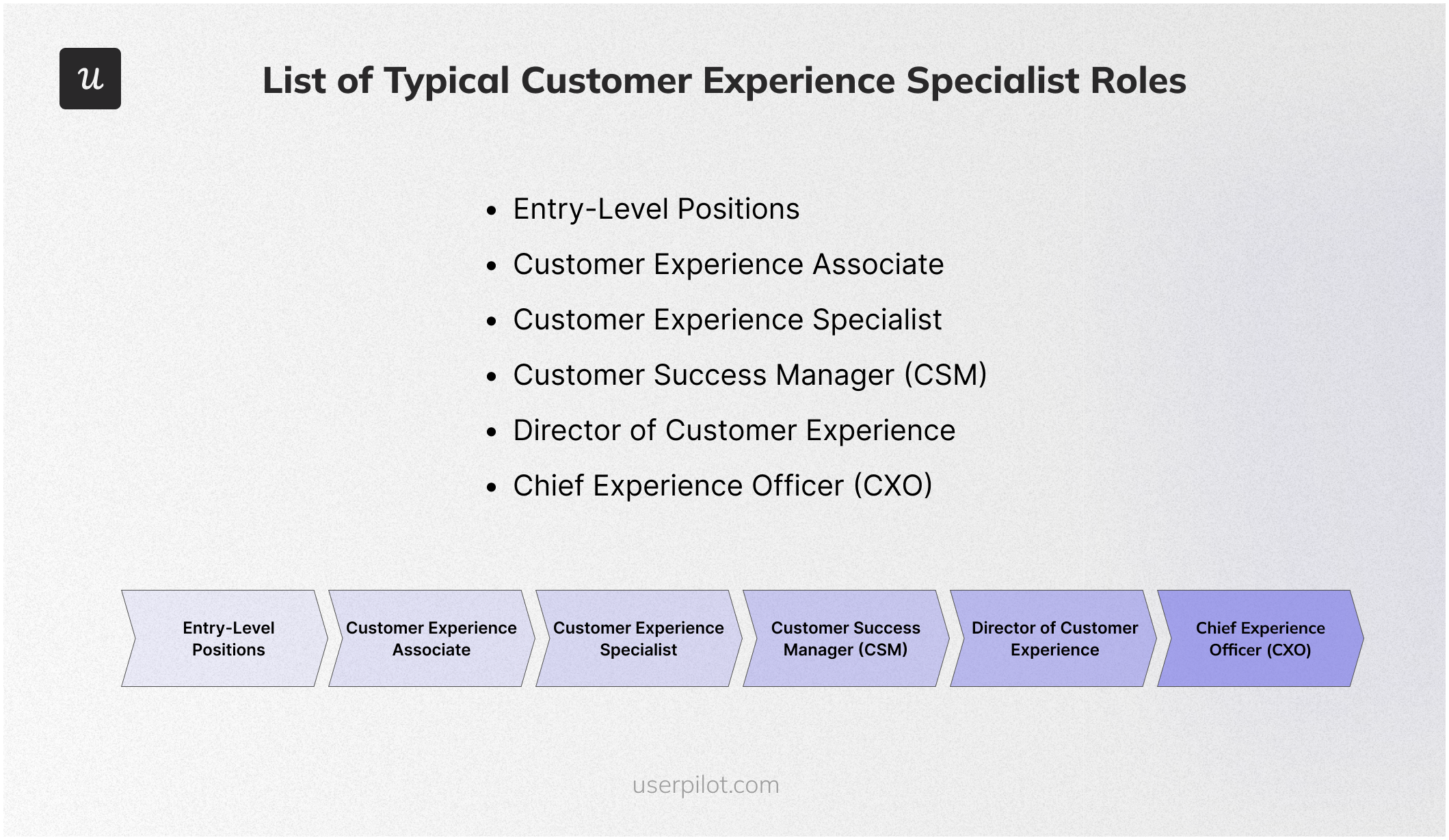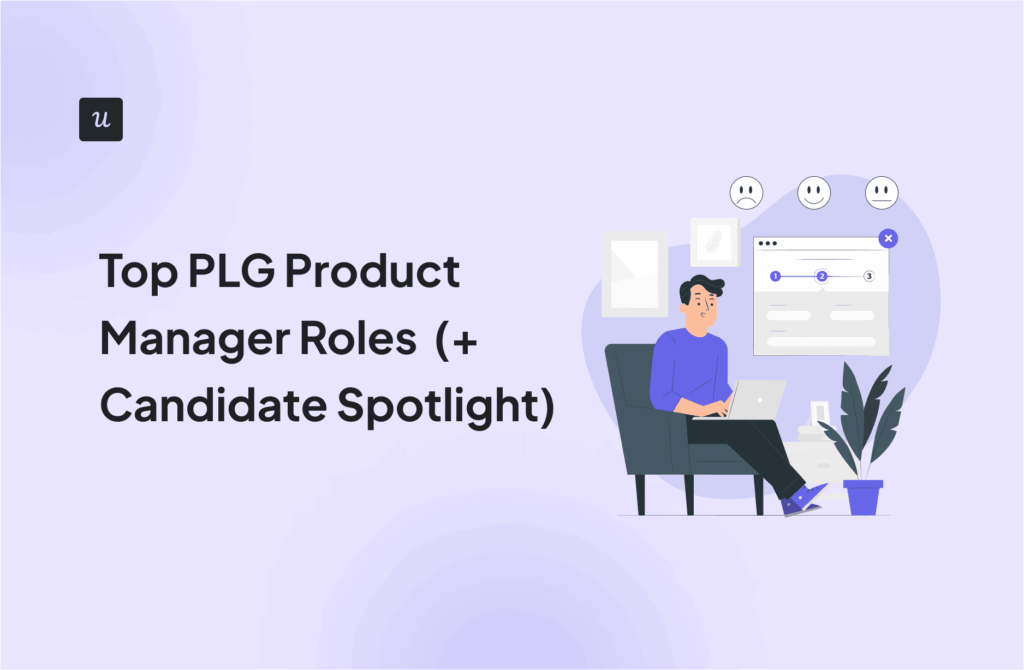![How to Become a Customer Experience Specialist [+Tools and Resources]](https://blog-static.userpilot.com/blog/wp-content/uploads/2024/06/How-to-become-a-Customer-Experience-Specialist-450x295.png)
Try Userpilot Now
See Why 1,000+ Teams Choose Userpilot

Customer experience specialist’s main responsibilities
Whether a company is looking to retain customers or grow its user base, customer experience specialists play an integral role. Key responsibilities of a CX specialist include:
- Customer journey mapping – A CX specialist identifies customer interaction touchpoints and the challenges they face at every step. The idea is to remove friction from each touchpoint and ensure a seamless journey from start to finish.
- Customer engagement and support – A CX specialist is responsible for interacting with customers before, during, and after a conversion. They have to address customer queries and help them overcome any issues they face when using your product.
- CX strategy development – A CX specialist works with different departments, such as account management, product development, marketing, and sales, to identify strategies to enhance the customer experience. Also, they’re responsible for keeping an eye on emerging industry trends and changes in customer behavior and needs. Then, they use these insights to adapt CX strategies accordingly.
- Data analysis and reporting – A CX specialist analyzes qualitative and quantitative data from various sources to identify areas of improvement. These include feedback surveys, focus groups, and one-on-one interviews. Also, they use product analytics tools to analyze user behavior patterns and product metrics. They retrieve actionable insights from the available data and create meaningful reports to help other departments make data-driven CX-related decisions.
- Training and development – A CX specialist is responsible for educating their team members, as well as employees in other departments, about user needs and preferences. They train employees in various departments to embrace a customer-centric approach.
- Technology and innovation – A CX specialist identifies and uses tech-driven solutions to streamline functions like customer support and feedback collection. They also have to identify and implement processes to deliver outstanding CX without compromising efficiency.
Customer experience specialist career path
A CX specialist’s career starts with an entry-level role like a customer service representative or sales associate. It can go all the way up to Chief Experience Officer (CXO).
Common customer experience roles include:
- Entry-level positions (0-2 years) – Roles like customer service representative, sales associate, or retail associate act as an entry point to a career in customer experience.
- Customer Experience Associate (2-3 years) – A CX associate communicates with customers to understand what they want and keep them happy.
- Customer Experience Specialist (4-5 years) – After gaining experience as a CX associate, it’s possible to move to the role of a CX specialist. This role focuses on analyzing customer behavior and feedback, addressing gaps in CX strategies, and improving interactions at different touchpoints.
- Customer Success Manager (CSM) (5-7 years) – If you gain adequate experience as a CX specialist and demonstrate leadership abilities, the next step is to become a customer success manager. As a CSM, one of your main responsibilities will be to understand customer needs and communicate them to other departments. You’ll also have to lead cross-functional teams when implementing strategies to enhance CX.
- Director of Customer Experience (8-10 years) – This senior-level position is for professionals with significant experience in customer success management. In this role, you’re responsible for overseeing multiple teams and strategies aimed at improving CX.
- Chief Experience Officer (CXO) (10+ years) – This is usually the highest-ranking CX role in an organization. Besides customer experience, a CXO is also responsible for ensuring a positive experience for employees.

How to become a customer experience specialist?
When recruiting a CX specialist, most hiring managers look for candidates with at least a high school diploma. Some organizations might have specific educational requirements, such as a bachelor’s in business, communication, marketing, or a related field.
If you want to build a career as a CX specialist, you must have the required qualifications. Prior experience in a customer-facing role is a plus. If you’re a beginner, keep an eye out for internship opportunities in customer service and sales teams. Also, it’s a good idea to attend CX-related courses on online platforms like LinkedIn Learning and obtain the necessary certifications.
Additionally, try to gain hands-on experience using tools like customer relationship management (CRM) systems, project management software, and product analytics platforms. While you’re at it, follow well-known industry publications, blogs, and other content to stay on top of new CX trends.
What skills should a customer experience specialist have?
A customer experience specialist serves as a bridge between a business and its customers. Must-have skills for this role include:
- Empathy – A good CX specialist must have a deep understanding of customers’ needs and pain points. In other words, they should be adept at putting themselves in a customer’s shoes, which makes empathy a non-negotiable skill.
- Communication – A CX specialist should have the ability to get messages across clearly and concisely. Their communication skills come in handy when interacting with team members and customers alike. Active listening is equally crucial as they should be able to hear the concerns of customers well.
- Collaboration – CX specialists have to work with different departments, such as marketing, product, and sales, to design a better customer experience. They must be adept at working in cross-functional teams—both remotely and on-site.
- Problem-solving and conflict resolution – A CX specialist should be well-versed in handling customer complaints/queries and offering the right solutions. Also, they should be able to maintain their composure when having difficult conversations with customers.
- Agility, flexibility, and speed – Given the fast-evolving nature of customer needs, CX specialists must be agile enough to keep up with these changes. They should be open to adapting their approach as customer mindsets shift or new industry trends emerge.
- Data analysis – A CX specialist should be well-versed in extracting meaningful insights from customer behavior data, feedback, and interactions.
- Knowledge of tools – To do your job well as a CX specialist, you should be well-versed with customer support tools like CRMs, chatbots, sentiment analysis tools, and others that can help you understand and elevate the customer experience.
Best certifications for customer experience specialist
Obtaining the right certifications can significantly boost your expertise and career prospects. Acknowledging that, here are some of the top certifications for CX professionals:
- Certified Customer Experience Professional (CCXP) (Customer Experience Professionals Association (CXPA)): This certification is a well-regarded option for CX professionals. CXPA is a recognized organization in the field, and the CCXP validates your understanding of core CX principles, including customer journey mapping, experience design, and measurement.
- Professional in Customer Experience (PCX) Certification (Customer Experience Professionals Association (CXPA)): This broader CXPA certification focuses on the entire customer experience journey. It can enhance your understanding of customer needs and expectations across all touchpoints.
Business Certifications (Valuable for CX Managers):
- Project Management Professional (PMP) Certification (Project Management Institute (PMI)): Many CX initiatives involve project management. This certification equips you with methodologies for managing projects like customer journey improvements or implementing new CX technologies, a skill valued by employers.
- Certified Business Analysis Professional (CBAP) Certification (International Institute of Business Analysis (IIBA)): CX managers often analyze customer data and feedback to identify areas for improvement.
Marketing & Analytics Certifications (Valuable for CX Managers):
- Professional Certified Marketing Manager (PCMM) Certification (American Marketing Association (AMA)): Understanding marketing concepts is valuable for CX managers. This certification strengthens your knowledge of marketing strategies and their alignment with customer experience goals.
- Google Data Analytics Professional Certificate (Google on Coursera): Earning this practical certification equips you with skills in data collection, analysis, and visualization using Google tools. Customer experience decisions are often data-driven, and having this certification can enhance your ability to make informed decisions.
Best resources for customer experience specialists
Here are some handy resources that’ll help CX specialists develop and improve their skills. Let’s take a look.
Best books for customer experience specialists
- The Effortless Experience – This book by Matthew Dixon, Nick Toman, and Rick DeLisi outlines a four-step framework to delight customers with a hassle-free experience.
- The Power of Moments – Written by Chip Heath and Dan Heath, this book decodes what goes into creating memorable moments for customers.
- What Your Customer Wants and Can’t Tell You – This book by Melina Palmer digs deep into consumer purchasing habits and the science behind them.
- The Starbucks Experience: 5 Principles for Turning Ordinary Into Extraordinary – Written by Joseph Michelli, this book talks about the customer experience successes of Starbucks and how you can take inspiration from them.
- What Customers Crave – This book by Nicholas Webb breaks down how you can understand your customers better and elevate their experience.
You can find these books on online stores like Amazon and eBay.
Best webinars for customer experience specialists
- Userpilot – The product growth platform offers various live and on-demand webinars on user onboarding, customer feedback, and product analytics.
- Cisco – If you want to learn from CX experts and stay on top of the latest trends in the field, Cisco offers a selection of webinars.
- BrightTALK.com – The platform features a vast collection of talks, videos, and webinars on CX-related topics by industry experts.
- Qualtrics – This platform offers numerous live and on-demand webinars that can help you improve customer experience.
- Oracle – Their webinar series focuses on CX trends and challenges along with tactics to elevate customer experience.
Best blogs for customer experience specialists
- HubSpot’s Service Blog features a variety of content on customer experience and success.
- Userpilot’s blog covers CX-related topics in the context of SaaS products.
- Customer Bliss features insights from Jeanne Bliss to help you attract, convert, and retain customers.
- Seth Godin’s blog includes numerous resources related to understanding customers and improving their experiences.
- CX Journey blog covers numerous topics related to customer experience and gives unparalleled insights to help CX specialists satisfy customers.
Best podcasts for customer experience specialists
- Amazing Business Radio by Shep Hyken – Leading CX experts and other business professionals come together to share their insights and tips; available on Apple, Spotify, and YouTube.
- The Intuitive Customer by Colin Shaw and Prof. Ryan Hamilton – The dynamic rapport between the hosts makes this podcast as much fun as insightful; available on Apple, Spotify, and YouTube.
- Experience This! by Joey Coleman and Dan Gingiss – Featuring a lively, upbeat vibe, this show covers all things CX, from core values to new trends; available on Apple and Spotify.
- Crack the Customer Code by Jeannie Walters and Adam Toporek – This podcast aims to understand how business owners and customer experience specialists can create stellar customer experiences; available on Apple.
- CXChronicles by Adrian Brady-Cesana – In this podcast, Adrian welcomes numerous guests and discusses all things customer experience with them; available on Apple, Spotify, and YouTube.
Best tools for customer experience specialists
On an average day, CX specialists have to perform several tasks, from communicating with customers to analyzing their feedback. Also, you have to collaborate with multiple teams and find ways to minimize friction in the customer journey.
Having the right tools at hand can help CX specialists do their jobs better. Here are a few tools worth considering:
- Best tool for project management: Trello – The Kanban-style platform makes it easy for cross-functional teams to collaborate on projects and monitor progress, regardless of their location.
- Best tool for product management: Confluence – The remote collaboration tool serves as a digital workspace where CX specialists can work with other teams involved in product development. You can use it to share insights from customer behavior data and feedback and guide the decision-making process for cross-functional teams.
- Best tool for CX: Zendesk – It offers a robust CRM solution to organize and manage customer data. Also, it offers customer service software with helpful features like AI-powered messaging and live chat.
- Best tool for customer success: Custify – It comes with an easy-to-use interface that lets CX specialists monitor customer health and minimize churn. Also, you can create automated workflows to onboard new customers and collect their feedback.
- Best product analytics tool: Userpilot – The powerful visual analytics platform helps CX specialists decode customer behavior patterns and map user journeys. It even comes in handy for generating easy-to-share reports.
Customer experience specialist FAQs
Is customer experience specialist a good career?
The demand for customer experience specialists is growing across different industries, from retail and hospitality to SaaS. It’s a particularly good career option if you have a knack for problem-solving and interacting with different people.
What makes a good customer specialist?
Essential skills for a good customer experience specialist include empathy, active listening, conflict resolution, and communication. A thorough understanding of feedback collection and data analytics is also crucial. Additionally, a CX specialist should have a finger on the latest market trends and changes in customer behavior.
What is a customer experience role?
A customer experience role, such as CX specialist or CX manager, is designed to help companies ensure positive interactions with customers. Professionals in CX roles are responsible for understanding customer needs and pain points and developing strategies to improve their experience.
What is customer experience in SaaS?
In the context of SaaS, customer experience covers every touchpoint a user goes through, from their first interaction to conversion to ongoing support. Frictionless CX is the key to driving user satisfaction, retention, and product adoption.
Conclusion
Becoming a successful customer experience specialist requires dedication, continuous learning, and a proactive approach to developing relevant skills.
By following the outlined steps and leveraging the resources available, you can effectively navigate your career path and achieve your professional goals.
We hope this guide has provided you with valuable insights and practical advice to help you on your journey to becoming a proficient and impactful customer experience specialist!
Looking into tools for customer experience specialists? Userpilot is an all-in-one product platform with engagement features and powerful analytics capabilities. Book a demo to see it in action!







